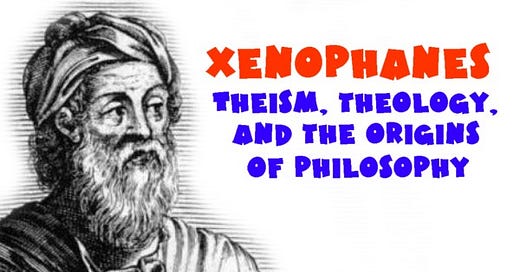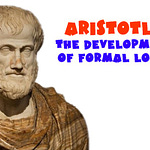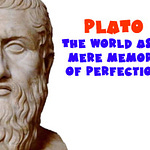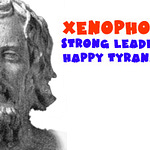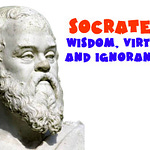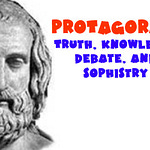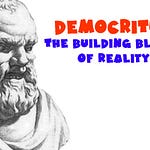Paid subscribers will have access to this and all other videos and bonus content.
Please consider upgrading to a paid subscription to enjoy and support this project.
You can also obtain the benefits of a paid subscription by sharing Three Minute Philosophy with others. For each new friend you bring in, you earn benefits. So spread the word!
Whenever you read about the “history of philosophy” it’s usually about the western philosophical tradition which starts in Greece around 600 BC-ish. It brings to mind a time when people suddenly started thinking about stuff after a long period of, I guess, not thinking about stuff. What’s more accurate is people started changing the way they thought about stuff.
Before what we commonly think of as philosophy emerged, the way we thought about the world was almost all through the lens of religion. It was a very simple and easy thing, that seemed to make a lot of sense, to explain unknown phenomena by kind of projecting human politics onto the universe. How does the sun move through the sky? Some guy living up there pulls it. Good enough for day to day purposes, and to make the kids shut up and stop asking so many questions because the field isn’t going to plow itself.
There are two ways to think about religion as an explanation for the way the world works—there’s cosmology and theology. Cosmology is the study of how the universe works in general, in this case using deities and supernatural elements to explain things. It’s sort of like using God as a scientific theory and studying it from outside the religion itself. In theology you’re already supposing the religion is true and you’re studying what the gods are doing and thinking from within it.
For much of early Greek philosophy, right through the big hits you already know like Plato and Aristotle, the way they thought about the world was theological. These guys all believed in Zeus and Apollo and all the rest. But what changed around the 6th century BC is that people started thinking about things in other ways as well.
But if we’re really trying to get at the very root of western philosophy then we need to go back a couple of centuries further to a guy named Homer, whose popularity in the western canon has since been eclipsed by a cartoon character of the same name but very little else in common.
Homer, also like the cartoon character, may not have existed. We’re not sure. We’re talking about the 8th Century BC, here. Not too long out of the Bronze Age. But either Homer or a bunch of people who we’ve grouped together for convenience and called “Homer,” is/are the author of The Iliad and its sequel The Odyssey, two of the oldest surviving works of literature we know about.
The Iliad and Odyssey are very similar to the Bible, in the sense that they are epic supernatural stories that religious people took as literal historical truth. There are, at the very least, elements of historical truth to these stories—they are based on the Trojan War, which really happened in some form. But they also have gods as characters, and mermaids, and there’s a cyclops at one point.
Together with another writer named Hesiod, who probably did exist and wrote a lot about farming, these stories and poems and tracts were the mythological basis for what was the religion of the Ancient Greeks. Although we don’t usually call Homer and Hesiod “philosophers” they do establish a primordial version of what would later become philosophy.
That happened around about the time of Xenophanes.
Xenophanes of Colophon was an early Greek philosopher who lived around 500 BC and is mostly known for his work on theology. When people first started gathering together in communities, that’s when the first class structures started to appear. Strength became power, and power became hierarchy. You can imagine how early humans living under a hierarchy would assume this power structure went all the way up, and that the laws of the universe were dictated and maintained by ever more powerful people.
Homer’s gods had a lot of trouble getting along with each other. Because they were essentially just really super-powerful humans, they exhibited all the common human personality flaws. Zeus, in particular, the king of the gods who was in charge of thunder and storms, was especially horny and a lot of the drama in ancient Greek legend came from the fact that Zeus couldn’t stop cheating on his wife.
Xenophanes was the first Greek to really question the religion of the time. He read all the stories about Zeus, Poseidon, Athena, Hades, and Aphrodite, and came to the conclusion that none of it made much sense. He concluded that humans were imagining the gods in their own image, rather than the other way around.
The Greek gods, even though they were supposedly all-powerful, still ate and drank, had jobs, married, had sex, had children, had affairs, had arguments, and occasionally murdered each other.
Xenophanes studied other cultures and their religions and discovered that everyone around the world seemed to picture the gods as looking very much like they did, for example the Greek gods looked Greek whereas the African gods looked African.
Xenophanes joked that if cows had religion, then their gods would have had horns, eaten grass, and mooed a lot.
Xenophanes decided it would make more sense if God truly was above all that nonsense. He didn’t bicker or pout, didn’t get into fisticuffs, or lose his temper, or sleep with his interns. Never argued with his wife and had to sleep on the couch. In fact, God shouldn’t want or need anything at all, because he’s God. He’s supposed to be able to do anything.
To avoid the trap of designing God in our own image rather than the other way around, Xenophanes imagined that God was a being of pure thought, who existed everywhere at the same time, knew everything there was to know, and could do anything. You might recognize these as the three key features of the God most religions worship today – omnipresence, omniscience, and omnipotence.
Crucially, what Xenophanes was proposing was an early form of monotheism, which is the belief that there’s one god that controls everything, as opposed to several gods who control lots of different things.
Crucially, what Xenophanes was proposing was an early form of monotheism, which is the belief that there’s one god that controls everything, as opposed to several gods who control lots of different things. Without going so far as to question theism itself, it nevertheless sought to simplify and standardise it.
As much as you might think that the history of philosophy is a steady progression of ideas, that’s not always the case. Although Xenophanes proposed the earliest known version of monotheism in the western tradition, he was an anomaly in his time, and his ideas didn’t really catch on for another 800 years or so. But at least he got to say he thought of it first.
Sources:
Adamson, Peter., Classical Philosophy: A history of philosophy without any gaps. Oxford University Press, 2014
Warren, James., Presocratics. Acumen, 2007
Lesher, James., Xenophanes. Stanford Encyclopedia of Philosophy, 2023.
What you get for subscribing:
Three Minute Philosophy is a fun and educational series of videos and essays about the history of philosophy.
Essays are free. Paid subscribers will gain access to full videos, printable PDFs, and possibly more in time.
Listen to this episode with a 7-day free trial
Subscribe to Three Minute Philosophy to listen to this post and get 7 days of free access to the full post archives.


